Unkept and Unaccounted: One Year of Governance Under Lai Ching-te
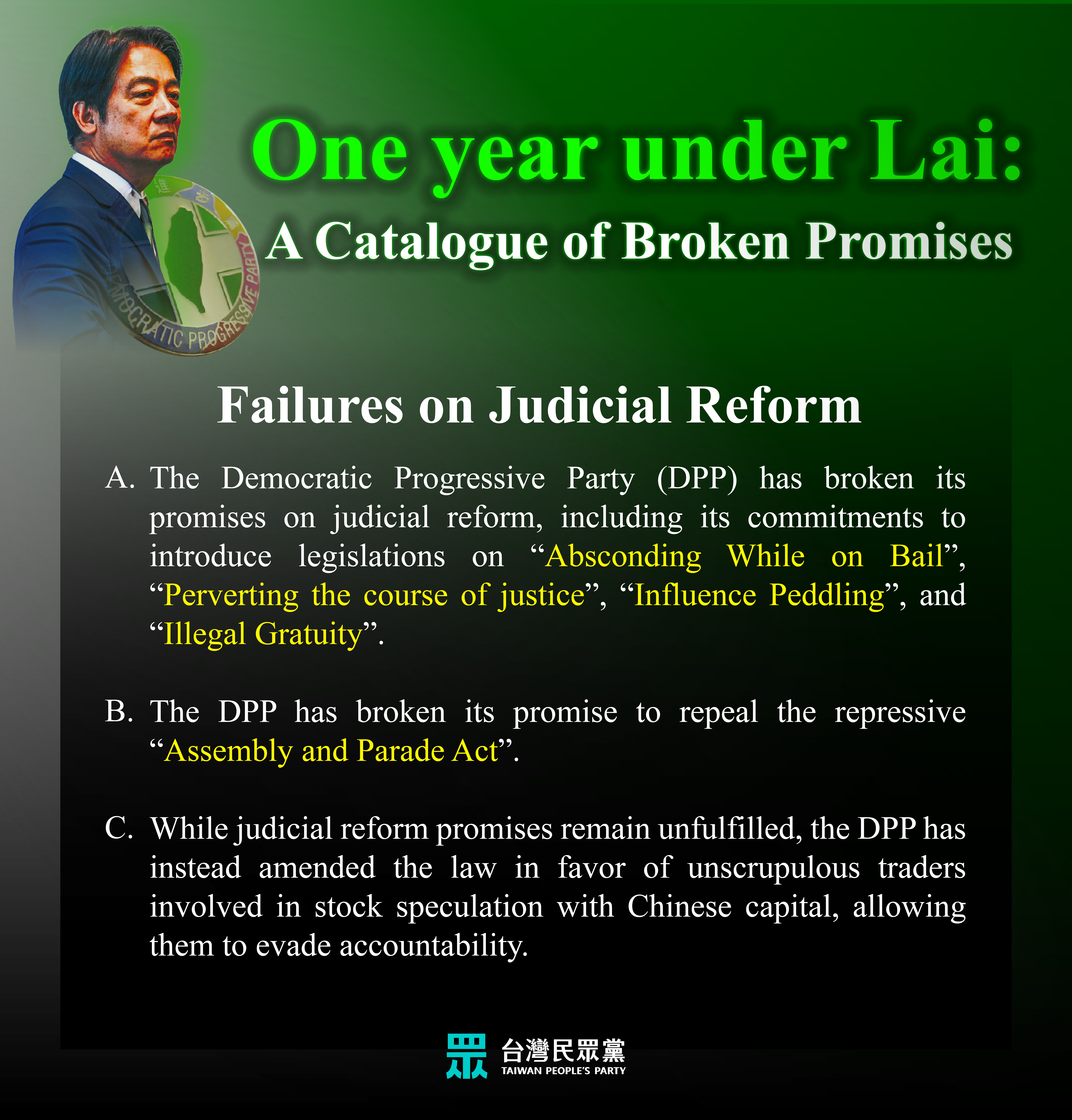
Judicial Reform
1. The Democratic Progressive Party (DPP) Reneged on Its Promise to Abolish the repressive Assembly and Parade Act
In 2008, Lai Ching-te stated that the DPP supported amending the Assembly and Parade Act by implementing a three-day advance reporting system and abolishing the approval system. At the same time, the DPP aimed to abolish the provisions related to restricted zones under the original Act, as well as remove the restrictions on freedom of speech previously imposed by the Act.
Taiwan People's Party’s Proposal:
In October 2024, the Taiwan People’s Party (TPP) introduced a draft amendment to the Act, advocating for renaming it the “Assembly and Parade Protection Act.” The TPP proposed replacing the approval system with the reporting system and called for a comprehensive review of restricted zones.
2. DPP Failed to Deliver on Judicial Reform Promises
1. Crime of Absconding
2. Crime of Obstruction of Justice
3. Crime of Influence Peddling
4. Crime of Illegal Gratuity
These offenses align with the principles of the United Nations Convention Against Corruption (UNCAC) and were once championed by the DPP. However, since the 9th Legislative Yuan convened in 2016—when the DPP returned to power—the Executive Yuan has not submitted any relevant legislation. The DPP continues to call for extended debate, but has taken no concrete action to date.
3. Corrupt Businessmen Linked to Chinese Capital Were Shielded by DPP Lawmakers
Taiwanese businessman Zheng Wen-yi (鄭文逸) colluded with a Chinese fugitive to manipulate Tatung Company stock for profit and was sentenced to 13 years and 6 months last year. Despite this, DPP legislators repeatedly attempted to amend the law in ways that could exonerate him. For example, in April of last year before the case was finalized, many DPP legislators proposed changes to the Securities and Exchange Act and the Business Mergers and Acquisitions Act that would alter the legal criteria for such crimes. Again, in April this year, DPP legislators Hsu Chih-chieh and Chiu Chih-wei led efforts to revise Article 441 of the Code of Criminal Procedure. These attempts, exposed by the Taiwan People’s Party, further illustrate that the DPP’s slogan “Resist China, Protect Taiwan” is mere rhetoric, even extending protection to someone like Zheng, who collaborated with Chinese fugitives and undermined the order of Taiwan’s financial markets.
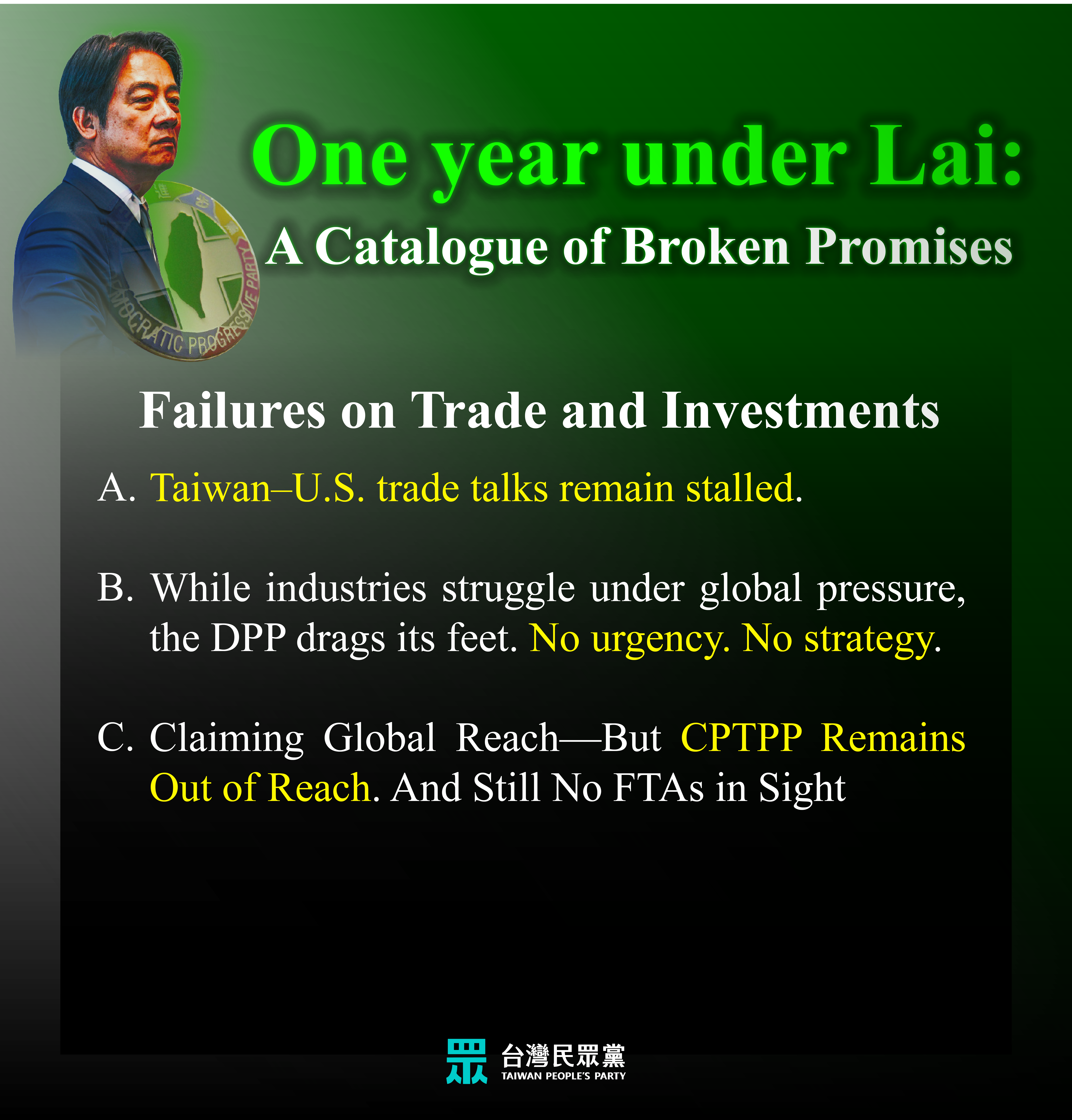
Trade and Economy
1. Zero Progress on Taiwan–U.S. Trade Agreement
During the 2024 presidential campaign, President Lai promised to push for Taiwan’s accession to the Comprehensive and Progressive Agreement for Trans-Pacific Partnership (CPTPP), vowing to make Taiwan an “empire which the sun never sets.” However, not only has Taiwan failed to join the CPTPP, it has yet to sign a Free Trade Agreement (FTA) with the United States. Although the government claims Taiwan-U.S. relations are stronger than ever, the trade agreement was not even included in the tariff negotiations.
On March 27, 2025, during a session of the Finance Committee, Legislator Huang Shan-Shan questioned the current progress of the Taiwan–U.S. 21st Century Trade Initiative, in light of the reciprocal tariff strategy adopted by the Trump administration. In response, Deputy Chief Trade Negotiator Yen Hui-Hsin of the Executive Yuan’s Office of Trade Negotiations admitted that no progress has been made on the agreement since the Trump administration took office.
2. Tariff Response Measures Lag Behind
3. Despite Seeking Diversified Markets, Taiwan Has Neither Joined the CPTPP Nor Signed Any FTAs
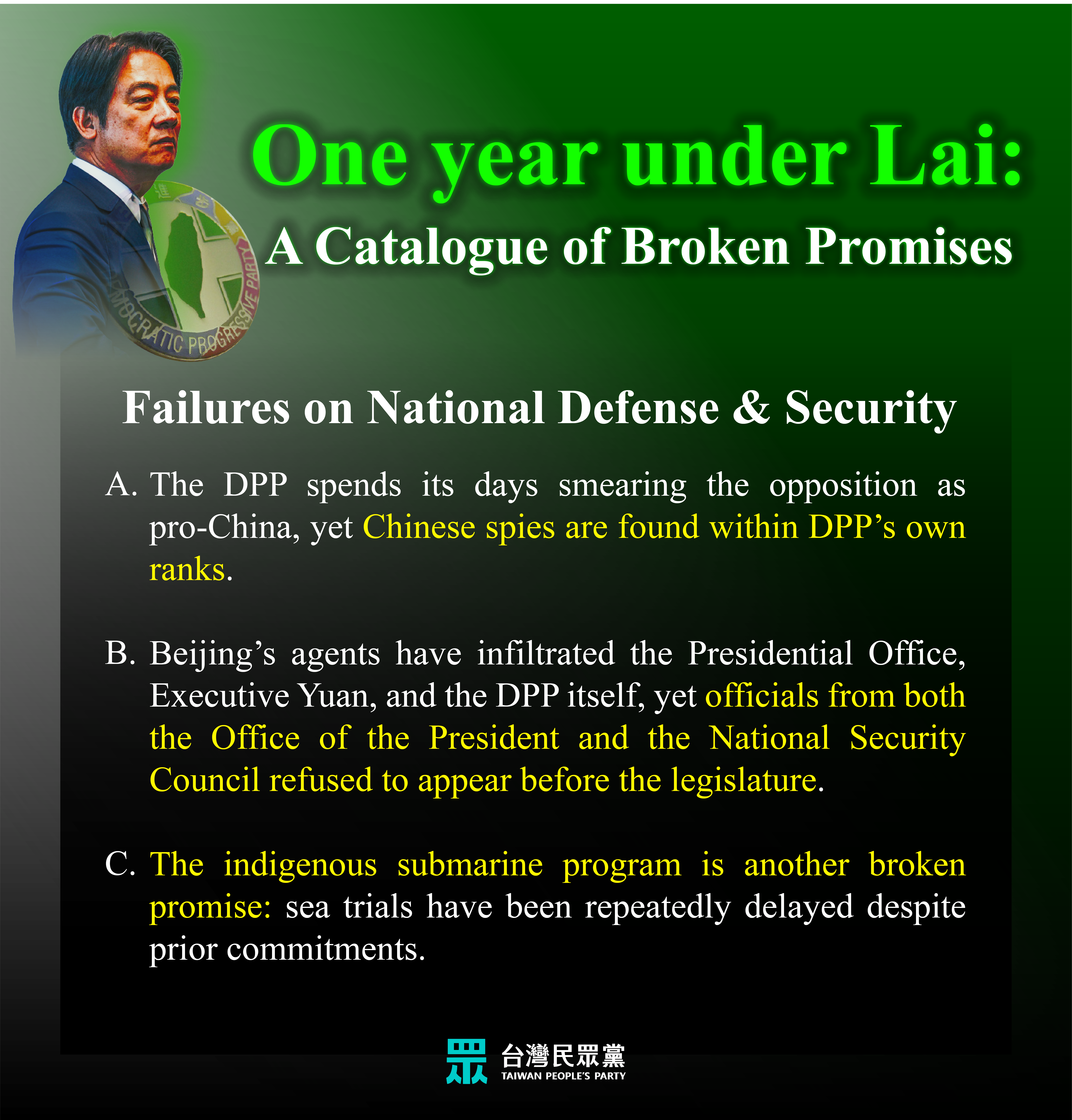
National Defense
1. Chinese Infiltration
The Presidential Office, Ministry of Foreign Affairs, Legislative Yuan, the DPP headquarters, and its local branches have all been implicated in Chinese espionage cases. On the 5th, the Judiciary and Organic Laws and Statutes Committee of the Legislative Yuan once again invited relevant agencies to deliver a special report on infiltration by Chinese spies. However, Presidential Office Secretary-General Pan Men-an and National Security Council Secretary-General Joseph Wu declined to attend. Their absence demonstrates the ruling party’s lack of seriousness and responsibility in addressing the national security risks posed by espionage infiltration.
2. Failure in Indigenous Submarine Program: Repeated Delays in Promised Sea Trials
The DPP government confidently promised that the indigenous submarine project was achievable. In reality, it has been a series of broken commitments. The Narwhal-class submarine was originally scheduled for sea trials in April, but as of May, no progress has been made. Minister of National Defense Wellington Koo appears to have no answers. Furthermore, the Ministry of National Defense’s budget unfreezing report conspicuously omitted any mention of funding for the indigenous submarine program.
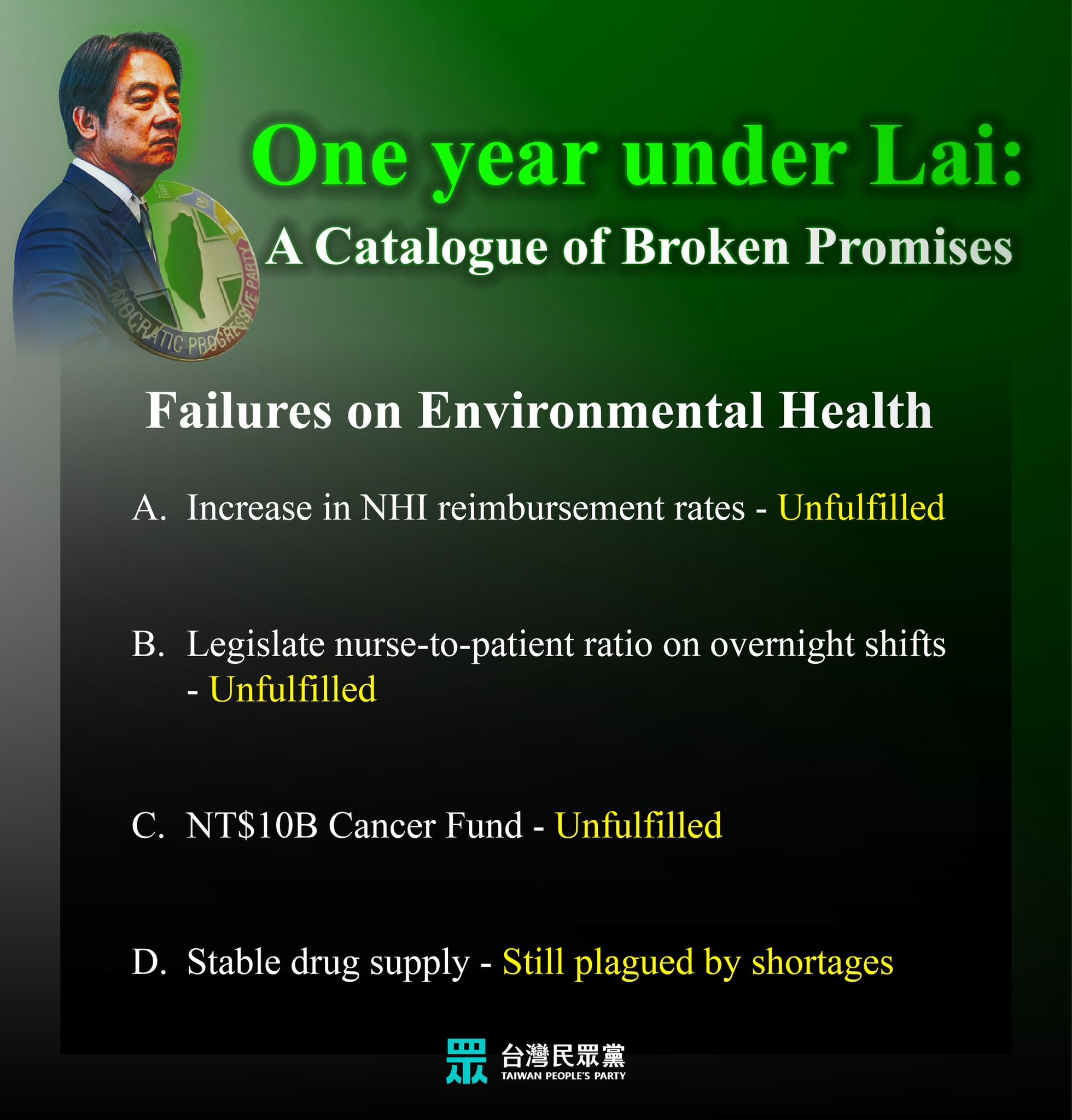
Social Welfare and Environmental Health
1. Lai Ching-te Broke His Promise on Enacting Nurse-to-Patient Ratios for Rotating Shifts
President Lai Ching-te pledged to enact legislation guaranteeing nurse-to-patient ratios for rotating and overnight shifts — yet the promise remains unfulfilled.
According to frontline nurses, one of the primary reasons for resignations is that the so-called “three-shift system” exists in name only. Excessive nurse-to-patient ratios have left nurses physically and mentally exhausted. If they can’t care for themselves, how can they be expected to care for patients?
Legislator Chen Gao-tzu (陳昭姿) pointed out that after receiving their professional certification, the average nurse stays in the field for less than six years, with 20% resigning within the first three months due to a lack of hope and direction. Chen stated that she has repeatedly questioned the Executive Yuan but has seen no tangible progress. In response, the TPP has proposed concrete legal reforms.
The TPP’s draft amendment to the Medical Care Act includes:
Mandating that nurse staffing ratios for acute general hospital beds be developed collaboratively by professional nursing organizations.
Establishing an advisory committee composed primarily of nursing representatives to review and update standards annually.
Strengthening penalties to ensure the law has real enforceability.
2. Lai Ching-te Broke His Promise to Raise the National Health Insurance Reimbursement Rate to NT$1.1
Prior to the election, Lai Ching-te pledged to raise the average National Health Insurance (NHI) reimbursement rate to NT$1.1 per point. However, during the 2024 Legislative Yuan review of Article 62 of the National Health Insurance Act, the government claimed it lacked the necessary funds to fulfill this promise.
Minister of Health and Welfare Chiu Tai-yuan estimated that meeting the NT$1.1 target would require NT$100 billion, yet the Ministry’s general budget allocated only NT$33.1 billion, much of which was unrelated to point value adjustments. As a result, the public saw little reason to believe the commitment would be kept.
Legislator Chen Gao-tzu (陳昭姿) emphasized that once the point value is increased, a fixed portion of medical institutions’ surplus should be used to improve salaries and workplace conditions for healthcare professionals, especially nurses. This incidental resolution gained bipartisan support from both the KMT and DPP.
3. Lai pledged a NT$10 billion cancer drug fund, but only NT$5 billion was allocated in the first year. Minister Chiu even admitted it would take three years to fully implement, another broken promise.
Many safe and effective cancer drugs remain inaccessible due to incomplete coverage. The Ministry of Health and Welfare has imposed inhumane restrictions such as limiting eligible patients, setting arbitrary timeframes, and capping the number of treatment rounds making it nearly impossible for many patients to receive life-saving medications. Chen Gao-tzu stressed that the cancer drug fund was intended to provide timely access to advanced treatments. Yet that mission has clearly fallen short.
4. Lai Ching-te Broke His Promise on Implementing a Tiered Healthcare System
The promise to implement a tiered medical care system has also gone unfulfilled.
In 2024, Legislator Chen Gao-tzu warned that the government must take urgent action to enforce tiered healthcare. The Taiwan People’s Party caucus in the Legislative Yuan followed up with a main resolution, calling on the Ministry of Health and Welfare to prioritize improvements in healthcare working conditions, reform National Health Insurance policies, and address drug price distortions. These efforts are essential to fundamentally and systemically correct the imbalance in nurse-to-patient ratios and prevent the collapse of Taiwan’s healthcare system.
In March of this year, Legislator Lin Yi-chun also raised concerns during a general interpellation session in the Legislative Yuan, pointing out that emergency room overcrowding has long been a structural issue in Taiwan's healthcare system. She stressed that the government must take immediate actions to implement reforms.
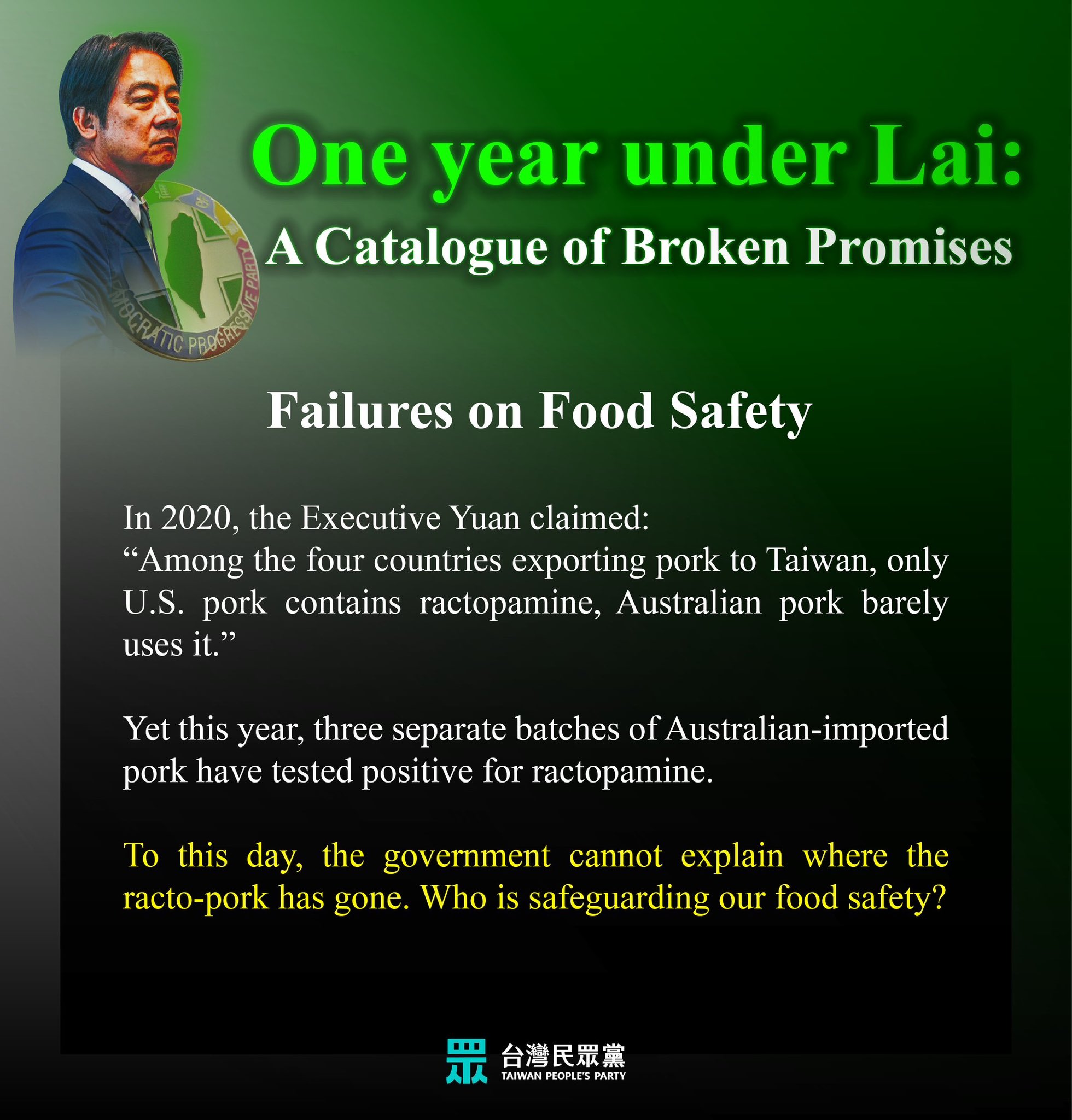
5. Food Safety, Double Standards!
While in opposition, DPP fiercely opposed U.S. pork imports containing ractopamine (commonly known as “ractopork”), but now that it's in power, officials claim that as long as it meets standards, it’s “safe to eat every day for a lifetime.” This is hypocrisy at its peak.
Back when U.S. ractopamine pork was first approved for import, the Executive Yuan rushed to release infographics stating that among the 26 countries that allow ractopamine, only four actually export pork to Taiwan, and only the U.S. would export ractopamine pork to Taiwan.
Yet just recently, over 700,000 metric tons of Australian pork entered Taiwan. Legislator Chen Gao-tzu questioned Minister Chiu Tai-yuan, whose response was: “Australian pork is not subject to facility inspections.” Chen slammed the DPP’s hypocrisy, asking: “With trade negotiations underway, how can the ruling party justify telling the U.S. that American pork imports require facility inspections, while Australian imports don’t?”
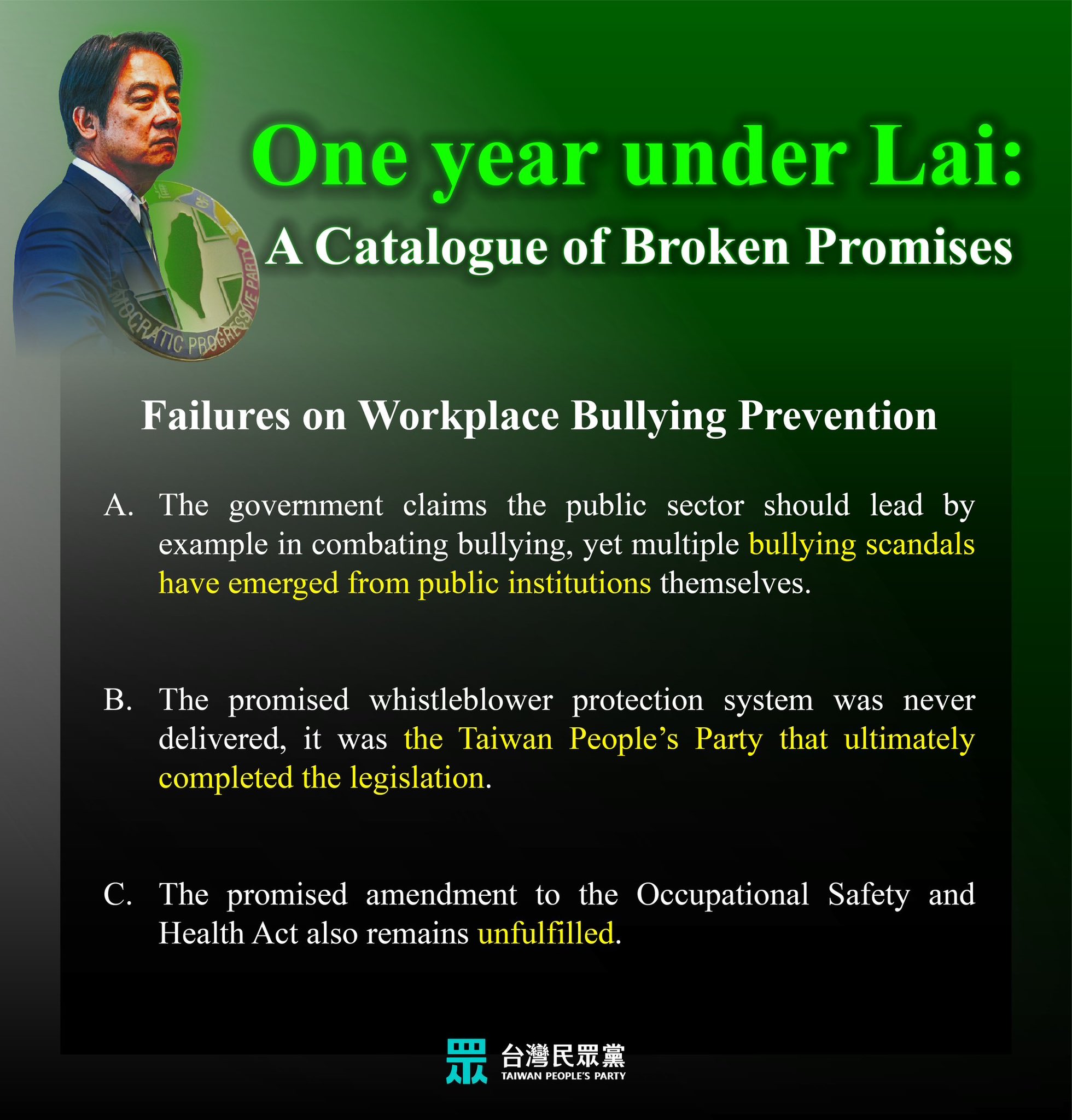
6. Lai’s Anti-Bullying Pledge Has Become an Empty Slogan
Before the election, President Lai Ching-te said he would promoted an anti-bullying agenda, promising to amend the Student Guidance and Counseling Act to implement a three-tier intervention system: developmental counseling, intervention counseling, and treatment counseling.
Yet more than a year into his administration, all we’ve seen is authorities covering up and shielding perpetrators.
Surveys conducted in colleges and universities show that only 23% of student victims are willing to file a complaint, because students don’t trust a system that offers them no protection. If the mechanism itself lacks credibility, how can it safeguard students’ safety and rights?
The Occupational Safety and Health Act has also seen no progress toward amendment. No draft has been submitted, and it hasn’t even been listed as a legislative priority. Taiwan’s complaint and protection systems are virtually nonexistent, investigations are handled internally, and unsurprisingly, almost always result in findings of “no wrongdoing.”
Is this government really anti-bullying — or is it leading the bullying?



